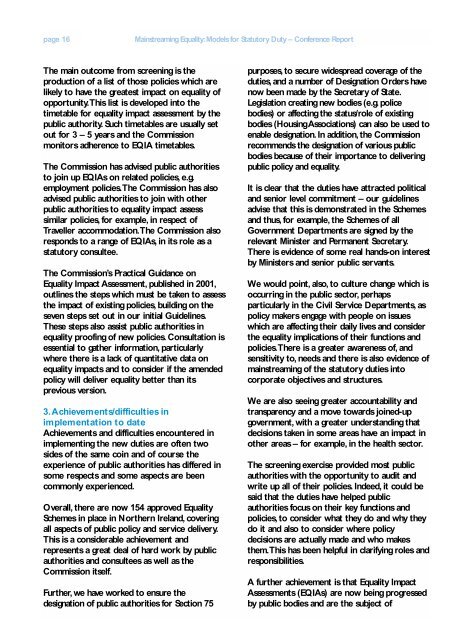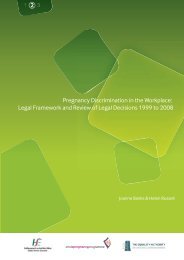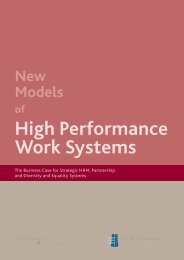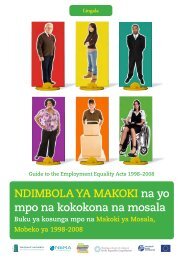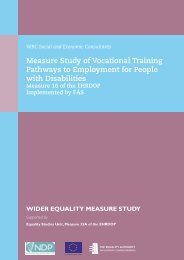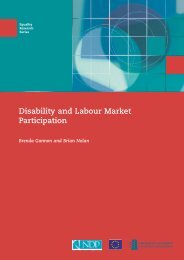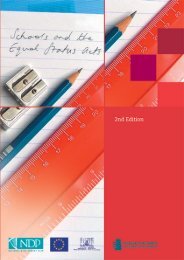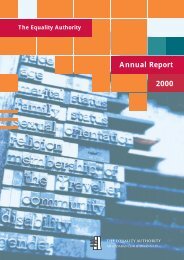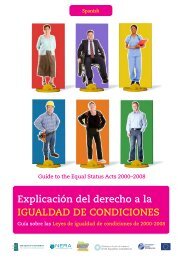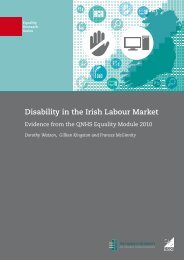Mainstreaming Equality Conference Report.pdf - Equality Authority
Mainstreaming Equality Conference Report.pdf - Equality Authority
Mainstreaming Equality Conference Report.pdf - Equality Authority
Create successful ePaper yourself
Turn your PDF publications into a flip-book with our unique Google optimized e-Paper software.
page 36<strong>Mainstreaming</strong> <strong>Equality</strong>: Models for Statutory Duty – <strong>Conference</strong> <strong>Report</strong>page 37<strong>Mainstreaming</strong> <strong>Equality</strong>: Models for Statutory Duty – <strong>Conference</strong> <strong>Report</strong>“An Absolute Duty” – Learningfrom WalesBy Kate Bennett, Director, EqualOpportunities Commission Wales;Paul Chaney, University of WalesIn the run-up to devolution in the 1990s, the EqualOpportunities Commission – and its partners –campaigned for an equality duty to be included inthe legislation setting up the Welsh Assembly.Wewere delighted that we were successful and sincethe establishment of the Assembly in 1999, theEOC, in particular, has pressed the Assembly totake this duty very seriously.After a couple of years we felt the duty was havinga significant impact.We were seeing new policiesand initiatives that we had not seen in Wales before– ones that differed from what was going on inEngland.We were anxious to try and measure thismore robustly.We wanted to be sure we were notseeing Wales through rose tinted spectacles.Wewanted to establish whether the equality initiativesthat we were experiencing in Wales actually arosefrom the duty, rather than from some other cause.We wanted to see whether this kind of positiveduty to promote equality could have wider benefitsif applied across the UK.So we joined with the Commission for Racial<strong>Equality</strong> and the Disability Rights Commission tocommission some independent research.Theresulting report by Paul Chaney was entitled:‘AnAbsolute Duty: Equal Opportunities and theNational Assembly for Wales’ (copies areavailable from the Institute of Welsh Affairs, orcan be downloaded from the EOC WalesSection of EOC website at www.eoc.org.uk).In this paper we will:• Outline the nature of the Welsh Assembly’sequality duty;• Examine the impact that it has had during theAssembly’s first term – what has the dutyachieved? What have the outcomes been?• Suggest that it is a model that has meritsand is an approach that could usefully beapplied to government elsewhere both inthe UK and beyond.So, turning now to the duty. It is a unique legalinnovation designed to secure the promotion ofequality of opportunity by government. It wasset out in the Government of Wales Act 1998;the Assembly’s founding statute.Government of Wales Act 1998Section .120:‘the Assembly shall makeappropriate arrangements with a view tosecuring that its functions are exercised withdue regard to the principle that there should beequality of opportunity for all people’In addition, section 48 of the Act says that theAssembly shall secure that its business isconducted with due regard to the same principleSo what kind of equality duty is this?What Kind of Duty?- unique- absolute- enforceableThe National Assembly’s equality duty isUNIQUE within the context of the UK’sdevolution legislation.It contrasts with the equality duties containedin the Scotland and the Northern Ireland Acts.In addition, it diverges with practice atWestminster where there is no general equalityduty placed upon MPs – although,Westminstermay, as in the case of the Race RelationsAmendment Act (2000), impose equality dutiesupon itself.A further distinctive aspect here is that whilstequality of opportunity is a reserved power andremains at Westminster, the Welsh Assembly’sequality duty modifies all Westminster Acts ofParliament where the Assembly has powers intheir implementation. So, it is a major area ofdivergence in the equality law applying in Walescompared to the rest of the UK.The Assembly’s equality duty is an example of whatlaw academics have called a ‘fourth generationequality law’. In that it requires government to bePRO-ACTIVE in equality matters.In terms of the duty’s ENFORCEABILITY, lawacademics have called it ‘ANABSOLUTE DUTY’ because – in their words –it ‘provides no escape clause’.What Kind of Duty?- innovative- systematic- inclusive- positive rightsWithin the context of the UK’s equality law , theWelsh equality duty is innovative and, as we shallsee, has led to a systematic approach to thepromotion of equality.It is a duty that is not focused on set equalitystrands, but rather one that aspires to aninclusive approach – one that is directed at allsocial groupings.The Welsh equality duty hasnon-prescriptive phrasing – and an all-embracingscope. It applies to ALL people and ALLAssembly Government functions.These functions are wide-ranging and are set outin S.22 of the Government of Wales Act.Theycover areas such as health, education, economicdevelopment and social services.As a result of these factors, legal analysis of theduty concluded that:‘the people of Wales are the first in the UK to begiven a series of ‘POSITIVE RIGHTS’ to exercise, and,if necessary, to enforce through the courts in Wales’.In this sense the duty has the potential to makegovernment more accountable in that it sets outwhat people can expect from their electedrepresentatives.This assertion is linked directly to the duty’slegal enforceability.An early perception of the Welsh Duty was thatit was a ‘weak’ duty. One that was based ongood intentions, but lacking any enforcementmechanisms.This is not true.Enforceability- Judicial Review- Welsh Administration Ombudsman- Any relevant court/tribunal proceedingsUnder Schedule 8 of the Government of WalesAct, the National Assembly may be subject tojudicial review if it is felt that it has failed tocomply with the provisions of the equality duty.Such a challenge may be made at any relevantproceedings before any court or tribunal. Underthese arrangements actions may ultimatelyproceed to the Privy Council for a final ruling.It is also possible that – under Schedule 9 of theGovernment of Wales Act – the WelshAdministration Ombudsman may challenge theAssembly in cases of alleged mal-administrationin relation to Section 120.However, the equality duty has yet to be testedin law. In particular, key terms in the duty like ‘tohave due regard’ and ‘appropriate arrangements’have yet to be fully defined in a legal sense.Therefore its enforceability is presently unknown.There would seem to be benefits in establishingexternal monitoring and enforcementmechanisms to oversee the duty – these couldbe possible new functions for a Single <strong>Equality</strong>Body in Wales if this is the way the governmentchooses to reconfigure the equalityinfrastructure in Britain.So, that is the nature of the Welsh Duty.We turnnow to consider its impact, what it has achieved.We will summarise the newly emerging distinctiveequality agenda in Wales – namely, policies andactions not previously known in Wales and notbeing pursued elsewhere in Britain.Distinctive <strong>Equality</strong> Agenda- budget setting- new consultative equality networks- commitment to mainstreamingIn relation to fiscal matters the AssemblyFinance Minister has referred to equality andother considerations leading to:‘an entirely new and radical way of producing abudget ’.


